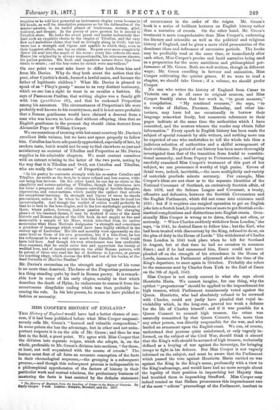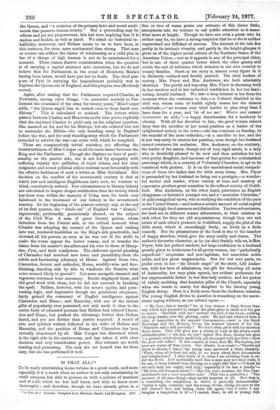MISS COOPER'S HISTORY OF ENGLAND.*
This History of England would have had a better chance of suc- cess, if it had been published before what Miss Cooper magnani- mously calls Mr. Green's "learned and valuable compendium." In some points she has the advantage, but in other and not unim- portant respects it is on the side of Mr. Green ; and then he was first in the field, a great point. We agree with Miss Cooper that the ditision into separate reigns, which she adopts, is, on. the whole, preferable to Mr. Green's division into sections, "for those, at least, not well acquainted with the course of events." The learner must first of all form an accurate conception of the facts in their chronological sequence,—the grouping is a subsequent process,—and though this subsequent process is indispensable to a philosophical apprehension of the factors of history in their particular work and mutual relations, the preliminary business of mastering the facts is best assisted by the definite statement * The History of England, from the Landing of Oxsar 10 the Reign of Vittoria. By Emily Cooper. 2 Tole. London : Simpkin, Marshall, and Co. 1877. ' of occurrences in the order of the reigns. Mr. Green's book is a series of brilliant lectures on English history rather than a narrative of events. On the other hand, Mr. Green's treatment is more comprehensive than Miss Cooper's, embracing the literary and scientific as well as the political and religious history of England, and he gives a more vivid presentation of the dominant ideas and influences of successive periods. The books may be profitably read at the same time, or immediately after each other, Miss Cooper's precise and lucid narrative being used as a preparation for the more ambitious and philosophical per- formance of Mr. Green. Both are well written, though in different ways ; Mr. Green excelling in fervour and sinimRtion, Miss Cooper cultivating the quieter graces. If we were to read a chapter, we should take Green ; if a volume, we should prefer Cooper.
No one who writes the history of England from Ciesar to Victoria can go in all cases to original sources, and Miss Cooper frankly states that her work is, "in great measure,"
a compilation. "My continual recourse," she says, "to the works of Hallam, Freeman, Macaulay, and other his- torians, may have led me occasionally to borrow their language somewhat freely, but numerous references to their pages indicate at the same time the authorities which I have consulted, and the sources whence the reader may obtain fuller information." Every epoch in English history has been made the subject of special research by able writers, and nothing more can be expected of one who undertakes to tell the whole tale than a judicious selection of authorities and a skilful arrangement of their evidence. No period of our history has been more thoroughly investigated than that of the transition from feudal to constitu- tional monarchy, and from Popery to Protestantism ; and having carefully examined Miss Cooper's treatment of this part of her subject, we can pronounce it worthy of high praise. Errors of detail were, indeed, inevitable,—the mere multiplicity and variety of materials preclude minute accuracy. For example, Miss - Cooper's ideas are not clear as to the separate identities of the National Covenant of Scotland, an exclusively Scottish affair, of date 1638, and the Solemn League and Covenant, a treaty, offensive and defensive, between the Scottish Covenanters and the English Parliament, which did not come into existence until 1643; but if it requires one surgical operation to get an English joke into a Scotch head, it requires two or more to get Scottish eccle- siastical complications and distinctions into English crania. Occa- sionally Miss Cooper is wrong as to dates, though not often, or seriously. "When Charles suddenly withdrew from London," she says, "in 1641, he desired Essex to follow him ; but the Earl, who had been treated with discourtesy by the King, refused to do so, on the plea of duty in the House of Lords." The withdrawal of Charles from London in 1641 took place when he left for Scotland in August, but at that time he had no occasion to summon Essex ; and if he had summoned him, Essex could not have pleaded off on the strength of his attendance in the House of Lords, inasmuch as Parliament adjourned about the time of the King's departure, to meet again in October. Probably she refers to the summons sent by Charles from York to the Earl of Essex on the 9th of April, 1642.
Miss Cooper is not nicely correct in what she says about Henrietta Maria. We cannot imagine, for one thing, why the epithet " preposterous " should be applied to the impeachment for high treason, which Parliament unanimously voted against the Queen. Henrietta, who had absolutely refused to be crowned with Charles, could not justly have pleaded that royal in- violability which, in the long-run, proved too weak a defence for the life of Charles himself ; and if it was possible for a
Queen Consort to commit high treason, the crime was assuredly committed by that Queen Consort, who, more than any other person, was directly responsible for the war, and who landed an armament upon the English coast. We can, of course, understand that persons quite uninformed, or only vaguely in- formed, on the subject of the Civil War, should think it absurd that the King's wife should be accused of high treason, technically defined as a levying of war against the Sovereign, for bringing troops to fight in his defence. But Miss Cooper is not vaguely
informed on the subject, and must be aware that the Parliament which passed the vote against Henrietta Maria carried on war against the King in the King's name, professedly with a view to the King's advantage, and would have had no more scruple about the legality of their position in impeaching her Majesty than
had troubled them in impeaching Strafford. Miss Cooper may indeed remind us that Hallam pronounces this impeachment one of the most "odious" proceedings of the Parliament, insolent to
the Queen, and "a violation of the primary laws and moral senti- ments that preserve human society." But a proceeding may be odious and yet not preposterous, this last term implying that it is useless and foolish, as well as harsh. We admit no historical in- fallibility, moreover, and Hallam seems to us to have been, in this instance, for once, more sentimental than strong. That man or woman can adduce the claims of relationship as a valid plea in bar of a charge of high treason is not to be entertained for a moment. Those claims deserve consideration when the question is of carrying a capital sentence into execution, but we do not believe that the Parliament, in the event of Henrietta Maria's having been taken, would have put her to death. The chief pur- pose of Pym in carrying the impeachment probably was to frighten the Queen out of England, and this purpose was effectively served.
Again, after stating that the Parliament required Charles, at Newcastle, among other things, "to surrender entirely to Par- liament the command of the army for twenty years," Miss Cooper adds, "the Queen urged him to submit even to these harsh con- ditions." This is calculated to mislead. The letters which passed between Charles and Henrietta at the time prove explicitly that she enjoined Charles to yield only on the religious question. She sneered at his zeal for his Bishops, but she ordered him not to surrender the Militia—the only standing army in England before the war, and the only standing army which the Parliament intended to survive the war—an order with which he complied.
These are comparatively trivial mistakes, not affecting the trustworthiness of Miss Cooper on all the main issues between the King and the Parliament. Though she displays no heat of parti- sanship on the patriot aide, she is not led by sympathy with suffering royalty into palliation of royal crimes, and her clear judgment and sound political ethics contrast most favourably with the effusive feebleness of such a writer as Miss Strickland. Her decision on the conflict of the seventeenth century is that at which just and intelligent Englishmen have now, we venture to think, conclusively arrived. Few circumstances in literary history are calculated to inspire deeper satisfaction than the victory which has been won, within the memory of living men, for truth over falsehood in the treatment of our history in the seventeenth century. At the beginning of the present century, nay, at the end of its first quarter, the "whole ear" of England was "abused," ingeniously, profoundly, perniciously abused, on the subject of the Civil War. A man of great literary genius, whose defection from the Patriot aide, at the critical moment when Charles was adopting the counsel of the Queen and rushing into war, rendered hostilities on the King's aide practicable, had devoted all his powers, so soon as he was out of the strife, to make the worse appear the better reason, and to transfer the blame from his master's shoulders and his own to those of Hamp- den, Pym, and their coadjutors. The elaborate special pleading of Clarendon had received new force and plausibility from the subtle and faseinating advocacy of Hume. Against these two, Clarendon, devout and orthodox, Hume, worldly-wise and free- thinking, standing side by side to vindicate the Stuarts, what voice seemed likely to prevail ? Not mere energetic research and vigorous utterance were necessary. Brodie displayed these, and did good work with them, but he did not succeed in breaking the spell. Hallam, however, with his severe equity, and pene- trating logic, and impressive though too ponderous eloquence, fairly gained the command of English intelligence against Clarendon and Hume ; and Macaulay, with one of the richest gifts of popularity ever possessed, not only made it clear to the entire body of educated persons that Hallam had refuted Claren- don and Hume, but pushed the advantage farther than Hallam dared, and yet not farther than justice required. A crowd of able and spirited writers followed in the wake of Hallam and Macaulay, and the position of Hume and Clarendon has been virtually abandoned by all. Miss Cooper has discerned which is the right side in the controversy, and has taken it with clear decision and very considerable power. Her volumes are worth reading and possessing. The task she set herself was far from easy, but she has performed it well.



































 Previous page
Previous page